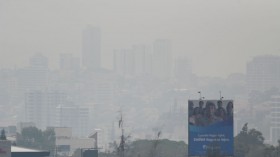Poor sleep can accelerate cancer growth and disrupt immune system, a new study has shown.
Researchers at University of Chicago Comer Children's Hospital and colleagues used mice models to study the link between disturbed sleep and cancer growth.
It's not the tumor, it's the immune system," said study director David Gozal. "Fragmented sleep changes how the immune system deals with cancer in ways that make the disease more aggressive."
Previous studies too have linked disturbed sleep with chronic conditions like stroke and cancer.
"Fortunately, our study also points to a potential drug target," he said in a news release. "Toll-like receptor 4, a biological messenger, helps control activation of the innate immune system. It appears to be a lynchpin for the cancer-promoting effects of sleep loss. The effects of fragmented sleep that we focused on were not seen in mice that lacked this protein."
Sleep Deprived Mice Lose the Ability to Fight Cancer
For the study, researchers used two sets of mice. These rodents sleep during the day which is why researchers attached a motorized brush on few of the cages. The brush moved once every two minutes, meaning one set of the mice wasn't allowed to sleep well.
Researchers then injected both the sets of mice with one of two tumor types (TC-1 or 3LLC), according to the news release. All mice developed tumors within the next few days. About a month later, researchers conducted an analysis of the tumors.
The study results showed that mice with poor sleep had larger, more aggressive tumors than mice that got to sleep peacefully during the research.
Immune System and Cancer
According to the researchers, tumor-associated macrophages (TAMs) might be involved in speeding up tumor growth in some mice. TAMs responses vary due to chemical signals. In some cases, M1-type TAMs increase immune system strength and fight cancer cells. However, in other cases, M2-type TAMs promote cancer by helping the tumor build more blood vessels.
In the present study, well-rested mice had more of the cancer-fighting M1s whereas the sleep deprived mice had more M2s.
Also, mice with poor sleep had high levels of toll-like receptors 4 (TLR4).
The scientists found that TLR4 and two downstream signals called MYD88 and TRIF were associated with the body having more M2. The three molecules- TLR4, MYD88 and TRIF are part of a key signalling pathway.
The team then injected the cancer cells in a series of mice that lacked one of the three molecules. They found that the mice that couldn't produce TLR4 had tumor growth that was comparable with the mice that had good sleep.
"When we injected tumor cells into mice that lacked TLR4," Gozal said, "the differences between undisturbed and sleep-fragmented mice disappeared."
Over a quarter of all people living in the U.S. report having insufficient sleep, according to data from Centers for Disease Control and Prevention.
© 2024 NatureWorldNews.com All rights reserved. Do not reproduce without permission.





